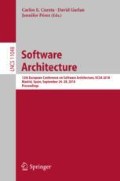Abstract
To deliver high-quality software, in a software development process a variety of quality attributes must be considered such as performance, usability or security. In particular, quality attributes such as security and usability are difficult to analyze quantitatively. Knowledge about such quality attributes is often only informally available and therefore cannot be processed in structured and formalized decision-making approaches to optimize the software architecture. In this paper, we have defined a framework in order to make use of informally available knowledge in automated design decision support processes. We connect qualitative reasoning models with models for quantitative quality estimation to optimize software architectures regarding both knowledge representation models together. By our approach quality attributes for which no quantitative evaluation model is available can now be used in automated software architecture optimization approaches. For evaluating our approach, we demonstrate its benefits using a real-world case study and an example that is related to a real-world system.
Access this chapter
Tax calculation will be finalised at checkout
Purchases are for personal use only
References
Aleti, A., et al.: ArcheOpterix: an extendable tool for architecture optimization of AADL models. In: MOMPES 2009. IEEE (2009)
Bachmann, F., et al.: Designing software architectures to achieve quality attribute requirements. IEE Proc. Softw. 152(4) (2005)
Bredeweg, B., Struss, P.: Current topics in qualitative reasoning. AI Mag. (2003)
Bredeweg, B.: Garp3-workbench for qualitative modelling and simulation. Ecol. Inform. 4(5), 263–281 (2009)
Busch, A., Koziolek, A.: Considering not-quantified quality attributes in an automated design space exploration. In: QoSA. ACM (2016)
Falessi, D., et al.: Decision-making techniques for software architecture design: a comparative survey. ACM Comput. Surv. (CSUR) (2011)
Franks, G., et al.: Enhanced modeling and solution of layered queueing networks. IEEE Trans. SE (2009)
de Gooijer, T., et al.: An industrial case study of performance and cost design space exploration. In: ICPE 2012 (2012)
Kazman, R., et al.: The architecture tradeoff analysis method. In: ICECCS (1998)
Koziolek, A.: Automated improvement of software architecture models for performance and other quality attributes. KIT Sci. Publishing (2014)
Koziolek, A., Koziolek, H., Reussner, R.: PerOpteryx: automated application of tactics in multi-objective software architecture optimization. In: QoSA. ACM (2011)
Martens, A., et al.: Automatically improve software models for performance, reliability and cost using genetic algorithms. In: WOSP/SIPEW 2010 (2010)
Microsoft Docs: Recovery Models (2016). https://docs.microsoft.com/en-us/sql/relational-databases/backup-restore/recovery-models-sql-server
Microsoft TechNet: Recoverability(2009). https://technet.microsoft.com/en-us/library/bb418967.aspx
Mylopoulos, J., Chung, L., Nixon, B.: Representing and using nonfunctional requirements: a process-oriented approach. IEEE Trans. SE (1992)
Nielsen, J.: Usability 101: Introduction to usability (2012). https://www.nngroup.com/articles/usability-101-introduction-to-usability/
Oracle HA Product Management: Technical comparison oracle database 12c vs. IBM DB2 10.5: focus on high availability. Technical report, Oracle Corporation (2013)
Regnell, B., Svensson, R.B., Olsson, T.: Supporting roadmapping of quality requirements. IEEE Softw. 25(2) (2008)
Reussner, R.H.: Modeling and Simulating Software Architectures: The Palladio Approach. MIT Press, Cambridge (2016)
Supakkul, S., Chung, L.: The RE-tools: a multi-notational requirements modeling toolkit. In: RE. IEEE (2012)
Svahnberg, M., Wohlin, C.: An investigation of a method for identifying a software architecture candidate with respect to quality attributes. Empir. SE 10(2) (2005)
Wu, X., Woodside, M.: Performance modeling from software components. In: SE Notes, vol. 29. ACM (2004)
Author information
Authors and Affiliations
Corresponding author
Editor information
Editors and Affiliations
Rights and permissions
Copyright information
© 2018 Springer Nature Switzerland AG
About this paper
Cite this paper
Schneider, Y., Busch, A., Koziolek, A. (2018). Using Informal Knowledge for Improving Software Quality Trade-Off Decisions. In: Cuesta, C., Garlan, D., Pérez, J. (eds) Software Architecture. ECSA 2018. Lecture Notes in Computer Science(), vol 11048. Springer, Cham. https://doi.org/10.1007/978-3-030-00761-4_18
Download citation
DOI: https://doi.org/10.1007/978-3-030-00761-4_18
Published:
Publisher Name: Springer, Cham
Print ISBN: 978-3-030-00760-7
Online ISBN: 978-3-030-00761-4
eBook Packages: Computer ScienceComputer Science (R0)

